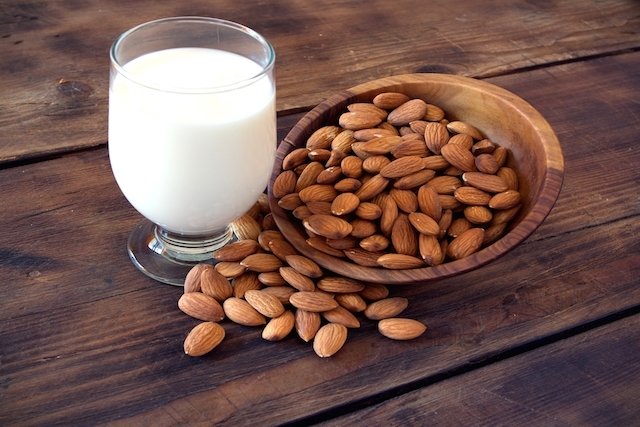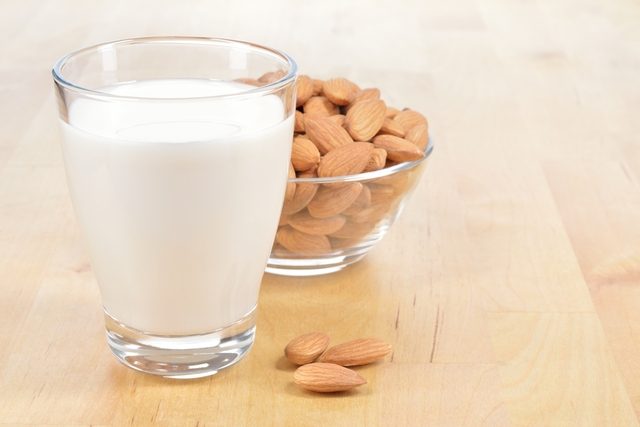Le lait d’amande est une boisson végétale, préparée à partir du mélange d’amandes et d’eau comme ingrédients principaux, largement utilisée comme substitut du lait animal, car elle ne contient pas de lactose, et dans les régimes amaigrissants, car elle fournit peu de calories.
Cette boisson végétale est riche en acides gras sains et en glucides à faible indice glycémique. Il fournit également d’autres nutriments importants pour la santé, tels que le calcium, le magnésium, le zinc, le potassium, les vitamines E et B.
Le lait d’amande peut être consommé au petit-déjeuner avec du granola ou des céréales, dans la préparation de crêpes et même pour accompagner le café. Il peut également être utilisé pour préparer des smoothies aux fruits et pour préparer des biscuits et des gâteaux par exemple.

Avantages pour la santé
Les bienfaits du lait d’amande pour la santé sont:
- Aide à perdre du poids, car chaque 100 ml ne contient que 66 kcal;
- Réguler la glycémie , car il s’agit d’une boisson à faible indice glycémique, c’est-à-dire qu’elle augmente légèrement la glycémie après ingestion (à condition qu’elle soit préparée à la maison, car certains produits industrialisés peuvent contenir des sucres ajoutés);
- Prévenir l’ostéoporose et prendre soin de la santé des dents, car il est riche en calcium et en magnésium;
- Aide à la prévention des maladies cardiovasculaires , car il est riche en graisses monoinsaturées et polyinsaturées saines qui aident à prendre soin de la santé cardiaque. De plus, certaines études indiquent qu’il peut aider à réduire le cholestérol LDL (mauvais cholestérol) et les triglycérides;
- Prévient le vieillissement prématuré , car il contient de la vitamine E, avec des propriétés antioxydantes qui préviennent les dommages cellulaires causés par les radicaux libres, en prenant soin de la peau et en prévenant la formation de rides.
De plus, le lait d’amande est une excellente option pour les personnes intolérantes au lactose, allergiques aux protéines du lait de vache, allergiques au soja, ainsi que pour les végétariens et les végétaliens.
Contrairement au lait de vache, le lait d’amande fournit peu de protéines, il n’est donc peut-être pas la meilleure option pour les enfants en pleine croissance ou pour ceux qui souhaitent augmenter leur masse musculaire. Dans ces cas, l’idéal est de consulter un nutritionniste pour des conseils personnalisés.
Valeur nutritive du lait d’amande
Le lait d’amande est faible en calories. De plus, il contient des glucides, mais ils ont un faible indice glycémique et une bonne quantité de fibres qui aide à réguler l’intestin.
| Composants | Quantité par 100 ml |
| Énergie | 16,7 kcal |
| Protéines | 0,40 g |
| Les graisses | 1,30 g |
| Les glucides | 0,80 g |
| Les fibres | 0,4 g |
| Calcium | 83,3 mg |
| Le fer | 0,20 mg |
| Potassium | 79 mg |
| Magnésium | 6,70 mg |
| Phosphore | 16,70 mg |
| Vitamine E | 4,2 mg |
Vous pouvez acheter du lait d’amande, qui est en fait une boisson aux amandes, dans les supermarchés et les magasins d’aliments naturels. Alternativement, vous pouvez faire du lait d’amande à la maison, pour être plus abordable.
Comment faire du lait d’amande à la maison
Pour faire du lait d’amande à la maison (DIY lait d’amande), vous avez besoin de:
Ingrédients:
- 2 tasses d’amandes crues et non salées;
- 6 à 8 tasses d’eau.
Mode de préparation:
Laisser tremper les amandes pendant la nuit. Le lendemain, jetez l’eau et séchez les amandes avec un torchon. Placez les amandes dans un mélangeur ou un robot et battez avec de l’eau. Filtrez avec une passoire en tissu fin et vous êtes prêt à boire. Si elle est faite avec moins d’eau (environ 4 tasses), la boisson devient plus épaisse et peut donc remplacer le lait de vache dans plusieurs recettes.
En plus d’échanger du lait de vache contre du lait d’amande, pour une vie plus saine et plus respectueuse de l’environnement, vous pouvez également échanger des bocaux en plastique contre du verre.
Qui ne devrait pas consommer de lait d’amande
Les personnes allergiques aux noix doivent éviter le lait d’amande. De plus, il ne doit pas non plus être administré aux enfants de moins de 1 an, car il contient peu de calories, est pauvre en protéines et autres nutriments nécessaires à la croissance et au développement du bébé.

